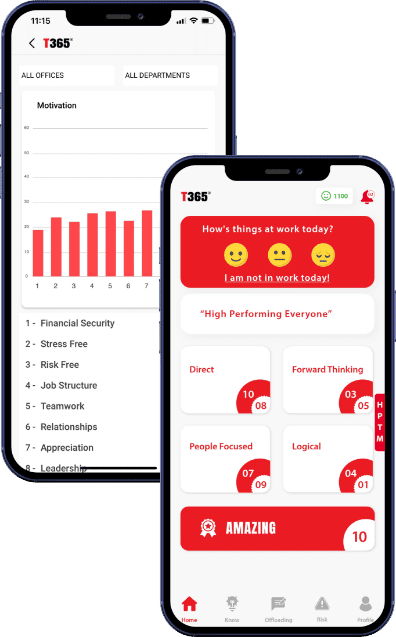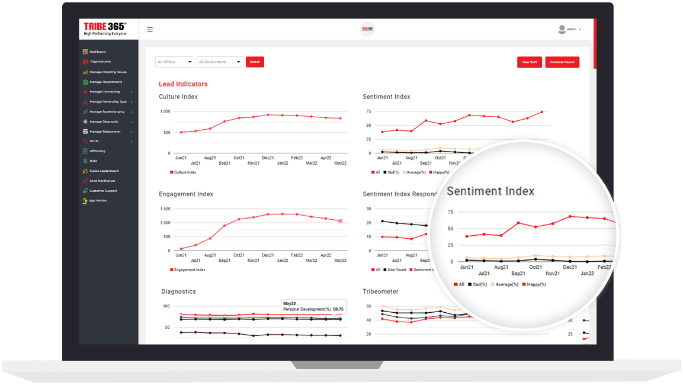How Do You Measure Company Culture?
Our technology-driven society is fixated with data science.
Manufacturers and the like use data and analytics to understand more about their own processes, with a mind to improving efficiencies, performance and profitability.
Brands use it to understand more about their customers, so that they can better serve their needs, or to get clearer insights into growing trends they can harness to outdo the competition.
Sports teams use it to gain insight about their opponents, improve tactics and – increasingly – to help players reach higher levels.
So how can HR or people departments use data to improve individual, team and company-wide happiness and performance?
HR Is Miles Behind When It Comes To Using Data Effectively
Businesses are so far behind when it comes to using data to understand their most important assets – their people.
In what is an increasingly competitive and fractured business global landscape, organisations’ respective bottom lines are being severely impacted because leaders and HR professionals don’t have the data and methodology to shape happy and high performance workplace cultures.
Can You Measure Company Culture?
Do HR or People departments have the data at their disposal to create workplaces filled with happy and high-performing employees? And is it even possible to measure culture in such a way that organisations can learn how to improve the running of their organisations from a personnel perspective?
Some commentators say that company culture can’t be measured in a tangible way. They believe that the aspects which workplace cultures chiefly consist of – leadership, values, traditions, beliefs, behaviours and attitudes – can’t be measured quantitatively.

Others strongly disagree. They say that there are lots of ways to measure such things, like:
- Quarterly or annual staff surveys
- KPIs (Key Performance Indicators)
- Team meetings and one-to-ones
- Focus groups
- Insights from exit interviews
- Monitoring of social media sites like Glassdoor
- Culture impact scorecards
At Tribe365, we fall into the latter category, as we passionately believe that culture can and absolutely should be tangibly measured.
But – and this is the key big difference and the rationale behind not just our Tribe365 app but also our workplace culture improvement programmes – we think that the methods listed above are inadequate measures of company culture.
Why?
Because by the time these methods have been applied and the results have come back in, everything has changed, thereby significantly reducing the relevance of the data and its power to enable positive organisational change.
How Do You Really Feel?
It may sound like a common place observation but, as humans, our moods and perceptions are subject to frequent change. You might feel completely different about something today than you will tomorrow.
Often, when we ask someone “How are you doing?”, they’ll just respond with a generic “I’m OK, thank you”.
Which is fine – it’s been a social custom for centuries.
But it doesn’t give us any particular insight into how they’re actually feeling, or coping with life and its general or specific challenges.
It’s also, in a sense, not totally honest.
Sure, everyday life would become pretty intense if we poured out our innermost feelings every time an acquaintance asked us “How are you doing?” in the street.
But what if it isn’t an acquaintance? What if it’s a dear friend or family member who’s genuinely invested in your wellbeing? Is it helpful to say “Oh, I’m fine” when really you and they know that you’re not? Absolutely not: especially if they’re potentially in a position to help if you tell them what the problem is.
It’s Important To Be Honest With Your Feelings In The Workplace
Now, let’s apply that same thinking to a workplace context.
Let’s say that you’re having a terrible week at work. It’s a horrible feeling, isn’t it?
And sometimes it can seem like the only two options available to you are:
- Do something rash, like hand your notice in
or
- Bottle it up and hope that things will eventually improve
Nobody should ever have to feel so alone and desperate in the workplace.
But one of the biggest obstacles to sharing problems at work is the fear of not being listened to – or, worse, getting into trouble for sharing your feelings about the situation.

How many times have you sat through a one-to-one with a rictus grin on your face saying “Yes, everything’s going ok”?
Why weren’t you honest with your manager about how you’re struggling with workload or confused by a strategy that’s been dropped on you from above?
Because you’re naturally anxious that you’ll be ignored or told off, that’s why.
As we found in the social situation described in the section above, people find it very hard to tell others what they feel or think face-to-face, therefore making one-to-ones only partly useful (and often very stressful for all parties).
And the result is that situations often end up in an unsatisfactory concussion for everyone.
Isn’t It Important For Leaders To Understand Their People?
Let’s switch positions and say that you’re the manager conducting a one-to-one with a team member who – for some reason you can’t put your finger on – has been strangely off-colour and performing below their abilities for a while.
You’re getting questions from the leaders above you about why this team member – and maybe another couple – are ‘off their game’. There’s some pressure on you because the de-energised and sub-par performance of your team is impacting negatively on the rest of the department – and reflecting poorly on your management skills.
Naturally, you want to put your finger on the reason or reasons.
But this team member – and others in the team – are evasive when you ask them what the problem is. So, what options are available to you? And how do you head these problems off at the pass?
Real-Time Workplace Culture Measurement
So far, it may seem like we’re providing more questions than answers. Posing quandaries rather than offering solutions.
But what if we told you that there is a way to measure team culture and improve performance on the basis of real and honest daily feedback from your people?
A piece of intuitive technology that negates the need for awkward conversations, and gives you real-time insights as opposed to outdated and stale employee satisfaction survey results?
Tribe Leads The Way On Workplace Culture
Improving workplace cultures and team or individual performance requires real-time measures and management.
Which is why our workplace culture experts – based on their experience of working for and with organisations like the NHS and GlaxoSmithKline – came up with the Tribe365 app to support a powerful range of proven data-driven cultural improvement methodologies.

The Tribe365 app is a 24/7 Culture Engagement tool which gives managers and leaders the daily analytics and insights they need to understand team performance and how to improve it.
An organisation might well have fantastic ideas, services and products. But they are worth very little without people – and if their happiness and performance drop, so will your organisations’ productivity, efficiencies and performance. And, by the time your bottom line has been hit, it’s far too late.
The Tribe365 app can be the canary that lets managers and leaders know when things aren’t where they need to be, so that they can rectify problems.
Even better, it can be the crystal ball that allows businesses to see internal workplace challenges appearing on the horizon and address them before they become big problems.
Learning how Tribe can help you improve your business culture and performance?

Interested in finding out more?
Book a meeting in with the Tribe team
today on +44 (0) 1325734847 or at
team@tribe365.co

















